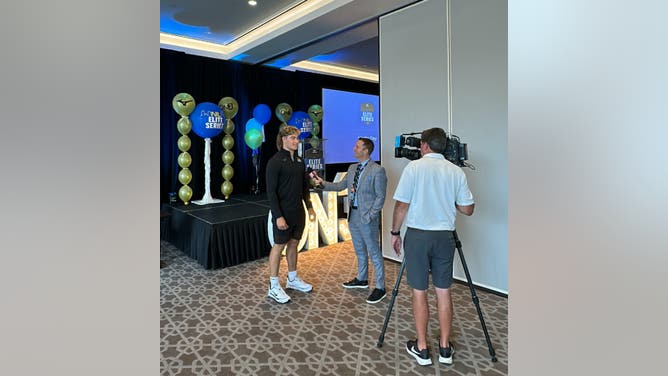Top College Football Recruits Reveal How To Know Whether Coaches Are Genuine About NIL And Interest Beyond Money
As college football recruits go through the process in the era of NIL, money is a factor. Period.

Money and recruiting go hand-in-hand. (Photos by Getty Images)
Whether it is the driving force behind the recruitment or not is one thing. Some prospects may value a dollar figure more than others. That's fine, but the financial element is impossible to avoid.
I spent Tuesday at the first day of the On3 NIL Elite Series in Nashville. It is a one-of-a-kind event that is focused on providing top recruits with the skills needed to thrive within the Name, Image and Likeness space.
While speaking to many of the top recruits in the Class of 2024, one particular word stood out to me over others — genuine. I heard "genuine" a lot.
As NIL collectives across the country continue to serve as the financial arm to recruiting, it has become a professional model, rather than one of amateurism. Lane Kiffin has been very vocal about that notion.
Nick Saban is not shy to speak about the dangers and downside to the new reality.
They are not the only coaches who have made their concerns (for lack of better word) heard. They are not the only ones to look at college football like a business.
Recruits are doing the same. Five-star defensive lineman Eddrick Houston, specifically, spoke to the importance of knowing his worth and how his value is determined in conjunction to supply and demand.
This is where that continuously-repeated word "genuine" comes into play.
Finding genuine people in the NIL space is tricky.
In most instances, the recruits themselves are not the ones who initiate the conversation surrounding NIL. Coaches, or staffers are bringing up money.
That's great, but the more that the NIL offers are discussed, the less genuine they often come across.
Houston admitted that it took some time to understand the thin line between genuine and spurious.
It's new to everyone, but you can figure out who is being truthful and who isn't as you go through it. It's all legal, which is crazy, but there are ways to know depending on how much they talk about the offer and how much they offer. Talking to other recruits and players can help too.
No. 1-ranked linebacker Sammy Brown, rocking his signature mullet that he one day hopes to leverage into a deal with a hair product company, echoed most of what Houston had to say. He found that NIL in recruiting was a "learn-as-you-go" type of thing, which made it easier to siphon out someone who was being authentic after going through the process with multiple schools than it was at the beginning.

Five-star linebacker Sammy Brown at the On3 NIL Elite Series.
Jaylen Mbakwe, a five-star athlete committed to Alabama, said that watching the market space around him helped to make it clear as to what was real and what was a facade.
I'm paying attention to all of the deals that are going on. You have to look at the money situation — like, $14 million is crazy. You might not get $14 mil. Don't just commit there because of the money. Commit there because of relationships.
The people that I have talked to (about NIL) have been pretty straightforward, and I like that. I like when a coach is being straightforward with me, and being honest and truthful— instead of a coach telling me that I will get a deal, and then when I get there, I don't.
Although five-star safety K.J. Bolden is trending toward Georgia, his recruitment remains open. So do his ears in terms of NIL offers.
He, like Houston and others, knows his worth. He has looked at the market from a holistic perspective, like Mbakwe, and knows when a number is too good to be true.
Safeties are in the $500-700,000 range. That's what I've been told by schools. Those ranges.
So if a school says you're going to get paid millions, they're lying. That's what a QB is getting.
For Jaden Reddell, a four-star tight end who is committed to Georgia, it can be intimidating.
Does a coach like me as a player, or is he trying to buy me as a player? I could always tell, because they didn't really talk to me about anything other than the money.
Carson Gentle has a bit of a different perspective. He is a three-star Tennessee commit with huge upside, but doesn't have the same "rating" as some of the other players in his class.
Still, though, NIL and genuineness was a big part of the equation.
You can totally tell who actually wants you there. A ton of other schools, they throw out that NIL thing. That was one thing about Tennessee and (defensive line) coach (Rodney) Garner. He's an old-school coach. He was talking about players wanting more and more money, which is not really what he is about and I respect that.
At the end of the day, whether NIL is the biggest component to a high school football player's recruitment, or the least important, the conversations are being had. Coaches are talking to athletes about Name, Image and Likeness and about financial opportunity— especially on official visits.
The difficulty lies, though, in seeing through the number and committing to a program for what is underneath the NIL offer. That can be difficult, especially for a 16/17/18-year-old.